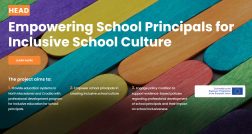Inclusion in the professional development programs for school principals – the role of policy coalition

The HEAD project policy dimension is built on the premises that efficient policy solutions are the combination of bottom-up and top-down approaches. The participation of experts in the policy making is crucial for the quality and the legitimacy of the process and results.
At the beginning of the HEAD project, partners from Croatia and North Macedonia invited academics, representatives of state institutions, experienced school principals, representatives of civil society organizations (CSO) to join the policy coalition. Building trustworthy relationship with representatives of policy coalitions will contribute to creating a strong advocacy group for the establishment of professional development for school principals in the area of inclusion.
Representatives of the policy coalition have been (and will continue to be) involved in the projects main activities. Firstly, they have been invited to provide their feedback about the Syllabus of the Pilot program for professional development of the school principals and then to observe the implementation of the program modules.
25 representatives joined the consultation on the Syllabus: six representatives of the State institutions; nine experts in the field; two from CSOs; three representatives of the European Associations and five experienced school principals. Majority of the comments on the Syllabus highlighted its relevance and importance in creating inclusive learning and teaching environments. It has been considered comprehensive program encompassing a wide range of the key concepts and aspects of the professional development of the school leaders for inclusive school cultures.
Nikica Mihaljević, from the Association of Croatian Primary School Principals stated how the program can help raising the awareness of school principals regarding the importance of inclusive school climate for all stakeholders – students, teachers, parents and local community. The school principals as team leader plays an important role in creating encouraging environment, that’s why they need to continuously work on their and stakeholders’ professional development.
Vesela Bogdanovikj, from the primary school Kocho Racin- Ivanjevci found very positive that the programme is envisioned to use many different teaching methods (group work, individual work, pairs) and techniques (role play, case study, group discussions) which enables to exchange experience between the participants, but in the same time the programme is focused on the individual needs of the participants.
The implementation of the Syllabus modules was observed by 14 representatives of policy coalition. They appreciated the methods and learning objectives of the modules and shared their impressions.
Prof. Zoran Velkovski, PhD, from the Skopje Faculty of Philosophy, Institute of Pedagogy, University Ss.Cyril and Methodius highlighted how program touches on the school reality with a special emphasis on universal contexts, such as school climate, principal-teacher relationship, teacher-teacher and teacher-student relationship, teaching and learning, which are common to every school environment in every country in the world, emphasizing its applicative value. On similar note, Vancho Petrushevski, former Deputy Director of the State Examination Center, added how the training created a realistic picture of the work and capacities of principals in their role as leaders, but also to define challenges and skills for building inclusive school culture. Zrinka Ristić PhD, from the Institute for Social Research in Zagreb, warned about the risk of bipolar way of thinking: us (principals) and them (teachers) and the need to put more emphasis on the importance of school as a unity.
The discussion about inclusion always requires wide and deep understanding of the topic to avoid superficiality as Tina Đaković, organizational coordinator at the House of Human Rights, warned: There is always a danger of slipping into simplifying complex relationships, phenomena and contexts (Example: This is always the case, this is what all people do, we all have the same needs, etc.).
In the design of the Syllabus as well as in the implementation, project partners committed time to discuss the expectations of school and community from school principals. Lana Golob, Senior Adviser in the Department of Education of the City of Rijeka reflected on this aspect:
We expect principals, in good but also difficult and challenging times, to readily and courageously lead their team, their students and provide a school in which a pleasant climate prevails, without adequately preparing and supporting them. The set goal of the Academy’s program for principals is to empower principals in areas that are extremely important for the work of principals such as leadership, human resources management, communication, school curriculum, etc., recognizes this lack of system and invests in support, empowerment, training and development of human resources that manage schools and are responsible for the climate and efficiency of schools. I think that the program was conceived and executed excellently, fully achieving a very high goal.
The empowerment of school principals is crucial for the establishment of the inclusive school culture, however, as Besa Dogani, from Faculty of Pedagogy, University of Tetova, highlited The inclusive school culture requires enlarged cooperation and partnership among school staff/teachers and the parents/legal guardians of the students. This interaction should be official, with establish deadlines, increased budged and material/technical/space resources, as well as support for the teachers and school support staff.
Both in Croatia and North Maceodnia, inclusive education in its broad understanding is very actual topic and several efforts have been made in the last decades. However, inclsuive education is a process that requires regular monitoring, needs analysis and continuos professional development.
Makfirete Ameti from Faculty of Pedagogy, University of Tetova reccomended as a follow-up activities:
- to include the teachers, parents as well as education representatives from the local institutions in training about inclusion;
- to implement school networking in order to share the positive experiences related to inclusion and inclusive school culture;
- to implement network with schools from abroad, to learn about the positive experiences regarding how inclusion functions and about the inclusive school culture in other countries.
More info: https://head.edupolicy.net/




